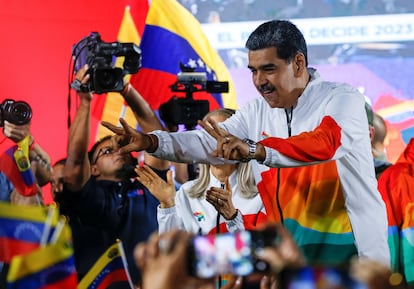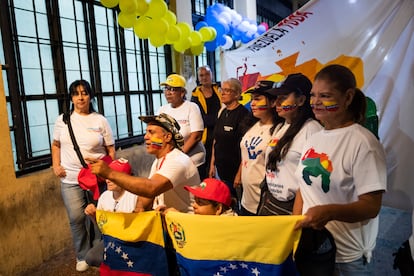Venezuela government claims victory in referendum to annex Essequibo, increasing tension with Guyana
The vote in favor of extending sovereignty over the oil- and mineral-rich area was 90% with a turnout close to 50%, according to the electoral authorities

Venezuela’s government on Sunday claimed victory in a non-binding referendum on the annexation of Essequibo, a jungle region of 61,600 square miles (160,000 square kilometers) in dispute with neighboring Guyana. According to the National Electoral Council (CNE), turnout was close to 50% and the result was overwhelmingly in support of annexation (90%). The Essequibo region represents two-thirds of Guyana’s territory, and authorities there see the poll as an explicit provocation by the government of Nicolás Maduro.
The president of the CNE, Elvis Amoroso, declared three hours after the closing of the polling places that participation in defense of Venezuelan sovereignty over Essequibo and the Geneva Agreement of 1966 was close to “10 million people,” a turnout figure that even former president Hugo Chávez, whose legacy remains alive through Chavismo, did not reach at the height of his popularity. Venezuelan authorities refuted claims that the influx of voters at polling places was low, and underscored that the issue of sovereignty over Essequibo cuts across party lines to become a national objective.
The Chavista administration had deployed a huge nationalist campaign to promote a map of Venezuela that incorporates the oil- and mineral-rich territory, which is larger than Portugal. Maduro was the first to support a referendum that could be viewed as the starting signal for his 2024 presidential campaign, in which he will face an opposition candidate that might be María Corina Machado, winner of the primaries, if her disqualification is finally lifted. The state apparatus promoted the vote with billboards, concerts, merchandise, military rallies and incessant advertising on social media.

However, images of empty voting centers circulated throughout the day. The absence of voters was a topic of conversation from very early on, and was palpable even in the newscasts of the state-run Venezuelan television, in which many national and regional leaders harangued viewers about their national duty to go vote. In some voting centers, members of the National Guard and students of the National Security University, among other state officials, were seen standing in line to vote.
Some important opposition politicians, such as former presidential candidate Henrique Capriles or Governor Manuel Rosales, decided to vote. But the most intransigent sectors of the Venezuelan opposition, who represent the majority at this time, questioned the referendum and called on the population to “not allow themselves to be manipulated.” María Corina Machado stated that she would not participate. Some analysts have stated that the speed of voting could explain the absence of lines, and that participation levels could be higher than estimated by the opposition, which distrusts official figures.
CNE chief Amoroso declared at 6 p.m. that opening hours would be extended until 8 p.m. to give the opportunity to those who had not been able to vote yet. Defense Minister Vladimir Padrino expressed satisfaction at the result of a “civic” initiative to claim legitimate national sovereignty in Essequibo. The news broadcasts on state television said that this was “the first popular consultation in defense of national sovereignty that has been held in our history.”
On Friday, Guyana asked the United Nations International Court of Justice, based in The Hague, to suspend the Venezuelan referendum. Chavismo took it as a victory that this organization did not explicitly suspend the vote, although the United Nations court did reiterate its warnings to Caracas “not to do anything that modifies the situation on the territory that Guyana de facto administers and controls,” while the court analyzes the substance of the territorial dispute, which involves the validity of the border defended by Guyana. The magistrates also expressed concern about the fifth question on the referendum, the one that generated the most suspicion, since it sought popular backing for the Maduro administration to to create a new state within the disputed territory and give Venezuelan citizenship to the approximately 125,000 people who live in that strip of jungle and who are already Guyanese.
Sign up for our weekly newsletter to get more English-language news coverage from EL PAÍS USA Edition
Tu suscripción se está usando en otro dispositivo
¿Quieres añadir otro usuario a tu suscripción?
Si continúas leyendo en este dispositivo, no se podrá leer en el otro.
FlechaTu suscripción se está usando en otro dispositivo y solo puedes acceder a EL PAÍS desde un dispositivo a la vez.
Si quieres compartir tu cuenta, cambia tu suscripción a la modalidad Premium, así podrás añadir otro usuario. Cada uno accederá con su propia cuenta de email, lo que os permitirá personalizar vuestra experiencia en EL PAÍS.
¿Tienes una suscripción de empresa? Accede aquí para contratar más cuentas.
En el caso de no saber quién está usando tu cuenta, te recomendamos cambiar tu contraseña aquí.
Si decides continuar compartiendo tu cuenta, este mensaje se mostrará en tu dispositivo y en el de la otra persona que está usando tu cuenta de forma indefinida, afectando a tu experiencia de lectura. Puedes consultar aquí los términos y condiciones de la suscripción digital.








































